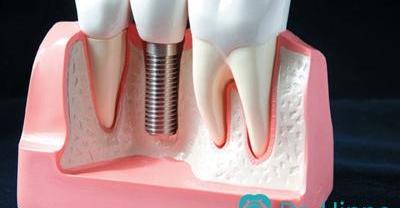Causes of dental implant failure
When missing teeth due to tooth decay, periodontal disease or injury, artificial implants have gradually replaced traditional dentures. Although artificial dental implants have become the most common treatment option for missing teeth, the failure of dental implants has still been heard.
The reasons for the failure of dental implant

Dental implants have become an option on the dental treatment list, and it is also the trend of treatment in the future, but the success rate is not 100%. Artificial dental implants may lead to the failure of dental implants due to incomplete preoperative evaluation, patients' personal health factors, poor oral cleanliness and so on.
Different literatures have different definitions of the failure rate of dental implants, but on the whole, the failure rate of dental implants in the initial surgical stage is about 1% to 5%, while the failure rate in the 10 years after long-term use is between 2% and 10%.
Finally, the reasons for the failure of dental implants are analyzed and summarized as follows:
1. Infected
For patients with insufficient bones, bone powder or other devices must be filled before dental implants to enhance stability, but the growth of these bones must be assisted by good blood circulation. If infection occurs during the operation, it will affect the joint between the implant and the bone, leading to the loosening of the artificial tooth root.
The action of tooth extraction before tooth implantation is very important. If there is a residual source of infection in the bone bed after tooth extraction, or if there are teeth extracted due to serious periodontal disease, it is not appropriate to implant teeth immediately; if you want to extract teeth and find that the root of the tooth is inflamed, debridement must be carried out after tooth extraction, and bone filling should be carried out to stabilize the strength of dental implants in the future.
two。 smoking
The wound healing period must have good nutrition, and the nutrition of the gums in the mouth is supplied by blood circulation. The nicotine in cigarettes will constrict blood vessels and inhibit blood circulation, resulting in a lack of nutrients around and reduce the ability of wound healing, and even increase the chance of infection.
3. Drugs for osteoporosis
In recent years, it has been found that some therapeutic drugs for osteoporosis will affect bone metabolism, resulting in complications of bone inflammation in patients, which may also cause implant loosening.
4. Patient's occlusal habit
Some patients have severe molars or excessive bite force at night. Excessive occlusal force may lead to overloading of the implanted root, bone absorption and loosening of the implant.
5. Poor oral hygiene
Poor oral hygiene not only affects the growth of artificial root implantation, but also has a key impact on the long-term use of artificial tooth implantation after successful implantation. There are many patients in the artificial dental implants, because of periodontal disease, poor oral cleanliness and oral inflammation, infection for a long time, which will shorten the use of artificial dental implants.
Generally speaking, the length of artificial tooth root is about more than 8mm, and the study found that, ideally, the surrounding bone will absorb about 1mm only after 10 years of use. Therefore, under normal circumstances, there is more than 80% chance of successful artificial dental implants, which can be used for at least 20 or 30 years.
However, in clinic, it is found that some patients with periodontal disease shorten the 2~3mm of artificial tooth root in just one year because of neglecting the cleanliness of oral hygiene, which greatly shortens the service life of artificial dental implant and finally has to be implanted again.
6. Reasons for mechanical design
It may come from dentists or relevant operators, such as inexperienced doctors, due to imperfect preoperative planning, incorrect selection of implants, angle, direction and position of implants, or poor evaluation of bone repair surgeries, poor bone materials and wound treatment, poor dentures, insufficient closeness of prostheses, etc., may also lead to some problems in long-term use.
Preoperative communication and postoperative care are the key.
Although artificial dental implants have their advantages, not everyone is suitable for dental implants. Before receiving dental implants, we must make a thorough evaluation to confirm whether they are suitable for dental implants. Whether patients smoke, take osteoporosis drugs, bone adequacy, oral cleaning ability, periodontal disease improvement and so on are all important factors for evaluation.
For those who have severe molar habits, poor oral hygiene, acute and chronic inflammation in the mouth, it will increase the failure rate of dental implant surgery. In addition, patients with poor general condition or serious diseases that cannot withstand surgery, severe diabetes or obvious complications, and serious mental patients are not suitable for dental implant surgery.
If you want to have a successful dental implant, it is very important to communicate with the doctor before operation, and it is also very important to confirm the doctor's specialty through detailed communication so that patients can have confidence before operation. After all, artificial dental implant is to provide a better quality of life, but relatively speaking, there is also a certain surgical risk, these patients should have a clear understanding and understanding before dental implant.
In addition, the maintenance of artificial implants is also very important. Although some of the dentures will not decay, but if the cleaning is not good, the artificial root may still have implant periodontal disease. It may cause bone absorption and destruction around the implant, and also cause loosening of the implant, so it is necessary to compare with natural teeth in cleaning, and even pay more attention to it; at the same time, patients with dental implants had better be reexamined every 3 months in the first year after implantation. after that, it should be reexamined at least twice a year to ensure the quality of implant teeth and maintain good function.
Preoperative evaluation of rapid dental implantation is very important.
The success of rapid dental implant depends on the weather, geography, people and ability, not every patient is suitable. In the outpatient clinic, we often see many cases that blindly pursue speed and blindly take immediate tooth extraction and immediate dental implant failure. After all, although this kind of operation is good, it still has its limitations, for example, it is not suitable for conditions where the extracted teeth have acute infection, periodontal disease or apical cysts, and the flesh and bones have been extremely damaged and atrophied.
The preoperative evaluation and examination of rapid dental implantation is very important, usually in order to succeed, the bone mass must be thick and high, and the occlusal angle of the upper and lower teeth is reasonable, and it is best that both the left and right teeth are missing instead of a single implant. because multiple teeth and left and right scattered, can disperse the gravity of the implant, to avoid a single implant to bear excessive bite force and make the root loose.
Due to advances in high technology, up-to-date computed tomography and full-mouth X-rays are used before dental implants to clearly see the tooth bone, the location of the maxillary sinus, the distribution of nerve growth and whether there is inflammation. The most important thing is to know how wide and high the patient's bone is to carry the implant, and then decide whether to quickly implant or not. However, clinically, it has also been found that some patients thought they could safely implant teeth after a computed tomography examination, but bone exfoliation was found after the operation, indicating that scientific and technological examinations sometimes still have a dead corner.
Periodontal patients need to be carefully evaluated
In addition, some patients with periodontal disease may not be suitable for rapid tooth implantation, especially for those with serious alveolar bone damage caused by periodontal disease, there may be a gap between the root of the tooth and the neighboring teeth, making the teeth look different in length and larger. The proportion of gums and teeth is not coordinated, affecting the appearance. If the alveolar bone is not enough, the implant will be exposed to the mouth, which will cause the implant or gingival infection, and the implant will collapse.
Rapid dental implant is not feasible, but there must be clear communication and complete preoperative evaluation with the physician before operation. if there is inflammation or serious bone defect, it is recommended to use the traditional medical mode to establish the bone bed step by step, and then carry out dental implant.
- Prev

Planting and management techniques of Paeonia lactiflora
First, the growth habit of peony is cold-resistant, like fertilizer and fear of waterlogging, like soil moisture, but also resistant to drought, sunshine and cool climate in summer. The peony is.
- Next

Matters needing attention in planting potted blueberries
With the improvement of people's living standards, home greening and beautification has become everyone's fashion pursuit. Potted blueberries will certainly become people's home greening and beautification.
Related
- Fuxing push coffee new agricultural production and marketing class: lack of small-scale processing plants
- Jujube rice field leisure farm deep ploughing Yilan for five years to create a space for organic food and play
- Nongyu Farm-A trial of organic papaya for brave women with advanced technology
- Four points for attention in the prevention and control of diseases and insect pests of edible fungi
- How to add nutrient solution to Edible Fungi
- Is there any good way to control edible fungus mites?
- Open Inoculation Technology of Edible Fungi
- Is there any clever way to use fertilizer for edible fungus in winter?
- What agents are used to kill the pathogens of edible fungi in the mushroom shed?
- Rapid drying of Edible Fungi

